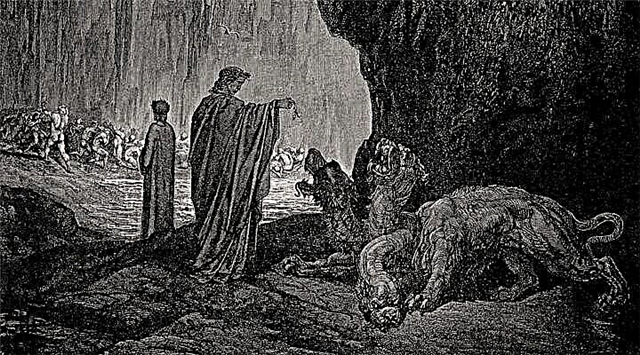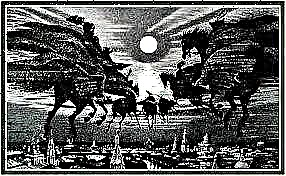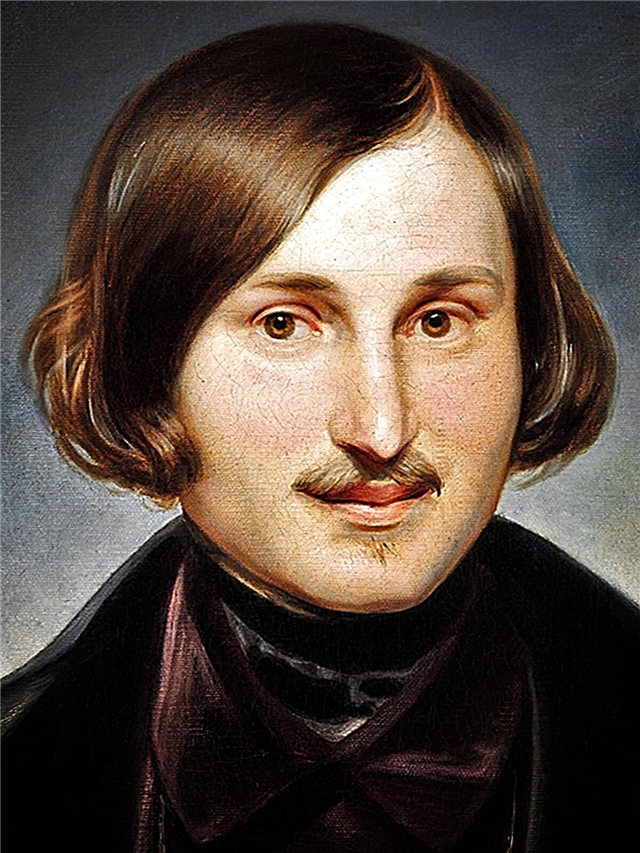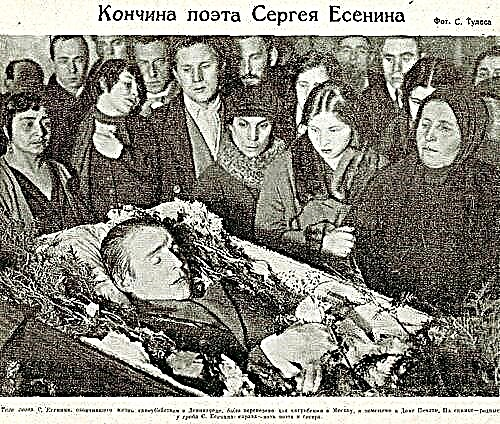The play is preceded by a dedication to Henrietta of England, the wife of the king’s brother, the official patron of the troupe.
The author's preface informs readers that the answers to those who condemned the play are contained in Critique (meaning comedy in one act Critique of the School of Wives, 1663).
Two old friends - Crisald and Arnolf - discuss the latter's intention to marry. Crizald recalls that Arnolf always laughed at unlucky husbands, assuring that horns are the destiny of every husband: "... no one, great or small, / From your criticism of salvation did not know." Therefore, any hint of loyalty to the future wife of Arnolf will cause a hail of ridicule. Arnolf assures his friend that he “knows how the wenches plant us horns” and therefore “I calculated everything in advance, my friend.” Enjoying his own eloquence and insight, Arnolf makes a passionate speech, characterizing the unsuitability for marriage of women too smart, stupid or immoderate goldfinches. In order to avoid the mistakes of other men, he not only chose a girl as his wife “so that he wouldn’t take preference over her husband either in the nobility of the breed or in the estate”, but he raised her from the very childhood in the monastery, taking the “burden” from the poor peasant . Strictness bore fruit, and his pupil was so innocent that she once asked, “are they likely to give birth from an ear?” Crizald listened so carefully that he did not notice how he called his old acquaintance by his familiar name - Arnolf, although he was warned that he accepted the new - La Souche - in his own estate (pun - la Souche - stump, fools). Assuring Arnolf that he would not make a mistake in the future, Chrysald leaves. Each of the interlocutors is sure that the other is undoubtedly strange, if not crazy.
Arnolf with great difficulty got into his house, because the servants - Georgette and Alain - did not unlock for a long time, succumbed only to threats and did not talk too reverently with the master, explaining very vaguely the reason for their slowness. Agnes comes with work in hand. Her appearance touches Arnolf, because “to love me, to pray, to spin and to sew” is the ideal of his wife, about which he told a friend. He promises Agnes to talk about important things in an hour and sends her home.
Left alone, he continues to admire his good choice and the superiority of innocence over all other female virtues. His thoughts are interrupted by a young man named Oras, the son of his longtime friend Orant. The young man reports that Enrik will come from America in the near future, who, together with his father, Horace intends to implement an important plan, which is not yet known. Horace decides to borrow money from an old friend of his family, as he became interested in a girl who lives nearby, and would like to "complete the adventure sooner". At the same time, to the horror of Arnolf, he pointed to the house in which Agnes lives, preserving which from evil influence, the newly-minted La Sush settled separately. Horace without a secret told a family friend about his feelings, quite mutual, to the pretty and modest beauty Agnes, who is in the care of a rich and near-minded person with an absurd surname.
Arnolf hurries home, having decided to himself that he will never give up the girl to a young dandy and will be able to take advantage of the fact that Horace does not know his new name and therefore easily trusts his heart secret to a person with whom he has not seen for a long time. The behavior of the servants becomes clear to Arnolf, and he forces Alain and Georgette to tell the truth about what happened in the house in his absence. Arnolf, waiting for Agnes, tries to pull himself together and moderate his anger, remembering the ancient sages.Appearing, Agnes does not immediately understand what her guardian wants to know, and describes in detail all her activities over the past ten days: "I sewed six shirts and caps in full." Arnolf decides to ask directly - was there a man in the house without him and did the girl have conversations with him? The recognition of the girl struck Arnolf, but he consoled himself by the fact that Agnes's honesty testifies to her innocence. And the girl’s story confirmed its simplicity. It turns out that while doing sewing on the balcony, the young beauty noticed a young gentleman who bowed kindly to her. She had to politely respond to courtesy, the young man bowed again and so, bowing to each other lower, they spent time until dark.
The next day, an old woman came to Agnes with the news that the young lady had caused a terrible evil - inflicted a deep heart wound on the young man with whom she bowed yesterday. The girl had to accept the young gentleman, since she did not dare to leave him without help. Arnolf wants to know more in detail, and he asks the girl to continue the story, although inwardly shudders with fear of hearing something terrible. Agnes admits that the young man whispered declarations of love to her, kissed her hands tirelessly, and even (here Arnolf almost went mad) took the ribbon from her. Agnes admitted that “something sweet tickles, offends, / I don’t know what, but my heart melts.” Arnolf convinces a naive girl that everything that happened is a terrible sin. There is only one way to rectify what happened: "By marriage, the guilt is removed." Agnes is happy because she believes that this is a wedding with Horace. Arnolf, however, refers to himself as a husband and therefore assures Agnes that the marriage will be concluded "on the same day." The misunderstanding is nevertheless clarified, since Arnolf forbids Agnes to see Horace and orders not to be allowed into the house under any circumstances. Moreover, he recalls that he has the right to demand full obedience from the girl. Then he offers the poor thing to get acquainted with the "Rules of Matrimony, or the duties of a married woman along with her daily exercises," because for "our happiness you will have, my friend, / And the will to curb and reduce leisure time." He forces the girl to read the rules aloud, but on the eleventh rule he himself does not withstand the monotony of petty prohibitions and sends Agnes to study them on his own.
Horace appears, and Arnolf decides to find out from him the further details of the barely beginning adventure. The young man is saddened by unexpected complications. It turns out, he informs Arnolf, that the guardian returned, who mysteriously somehow found out about the ardent love of his ward and Horace. The servants who had previously helped in their love suddenly behaved rudely and closed the door in front of the discouraged admirer. The girl also behaved sternly, so the unhappy young man realized that a guardian is behind everything and directs the actions of servants and, most importantly, Agnes. Arnolf listened with pleasure to Horace, but it turned out that the innocent girl proved to be very inventive. She really threw a stone from her balcony at her admirer, but along with the stone the letter that the jealous Arnolf, watching the girl, simply did not notice. But he has to laugh compelledly with Horace. Even worse was when he began to read Agnes’s letter and it became clear that the girl was fully aware of her ignorance, endlessly believed in her lover and the separation would be terrible for her. Arnolf was shocked to the core, learning that all his “labors and kindness had been forgotten”.
Nevertheless, he does not want to give up the pretty girl to a young rival and invites a notary. However, his frustrated feelings do not really agree on the conditions of a prenuptial agreement. He prefers to talk to the servants again in order to protect himself from the unexpected visit of Horace. But Arnolf was out of luck again.A young man appears and tells that he met again with Agnes in her room, and how he had to hide in the closet, because her guardian (Arnolf) appeared to Agnes. Horace again could not see the opponent, but only heard his voice, so he continues to consider Arnolf as his confidant. As soon as the young man has left, Chrysald appears and again tries to convince his friend of an unreasonable attitude towards marriage. After all, jealousy can prevent Arnolf from soberly evaluating family relationships - otherwise "the horns are almost worn / For those who earnestly swear to not know them."
Arnolph goes into his house and again warns the servants to better guard Agnes and not to admit Oras to her. But the unexpected happens: the servants tried so hard to fulfill the order that they killed the young man and now he lies lifeless. Arnolf is horrified that he will have to speak with the father of the young man and his close friend Oront. But, consumed by bitter feelings, he suddenly notices Oras, who told him the following. He made an appointment with Agnes, but the servants pounced on him and, knocking him to the ground, began to beat him so that he lost his senses. The servants mistook him for a dead man and began to moan, and Agnes, hearing the screams, immediately rushed to her lover. Now Horace needs to leave the girl for a while in a safe place, and he asks Arnolf to take Agnes in his care until he can persuade the father of the young man to agree with the choice of his son. The delighted Arnolf hurries to take the girl to his house, and Horace unwittingly helps him, persuading his beautiful girlfriend to follow his family friend in order to avoid publicity.
Left alone with Arnolf, Agnes recognizes his guardian, but holds on firmly, confessing not only to his love for Horace, but also that “I have not been a child for a long time, and it’s a shame for me / That I have been known as a simpleton until now.” Arnolf tries in vain to convince Agnes of his right to her - the girl remains inexorable, and, threatening to send her to the monastery, the guardian leaves. He again meets with Horace, who shares with him unpleasant news: Enric, having returned from America with a great fortune, wants to pass off his daughter for the son of his friend Oront. Horace hopes that Arnolf will persuade his father to abandon the wedding and thereby help Horace connect with Agnes. They are joined by Chrysald, Enric and Oront. To Horace's surprise, Arnolf not only did not fulfill his request, but advised Orontes to quickly marry his son, regardless of his wishes. Orant is glad that Arnolf supports his intentions, but Chrysald draws attention to the fact that Arnolf should be called La Souche. Only now, Horace realizes that his "confidante" was a rival. Arnolf orders the servants to bring Agnes. The case takes an unexpected turn.
Crizald recognizes in the girl the daughter of her late sister Angelica from a secret marriage with Enrique. To hide the birth of the girl, she was sent to be brought up in a village to a simple peasant woman. Enric, forced to seek happiness in a foreign land, left. And the peasant woman, having lost her help, gave the girl to Arnolf for education. The unfortunate guardian, unable to utter a word, leaves.
Horace promises to explain to everyone the reason for his refusal to marry Enrik’s daughter, and, having forgotten about Arnolf, old friends and young people enter the house and “we will discuss everything in detail there.”











